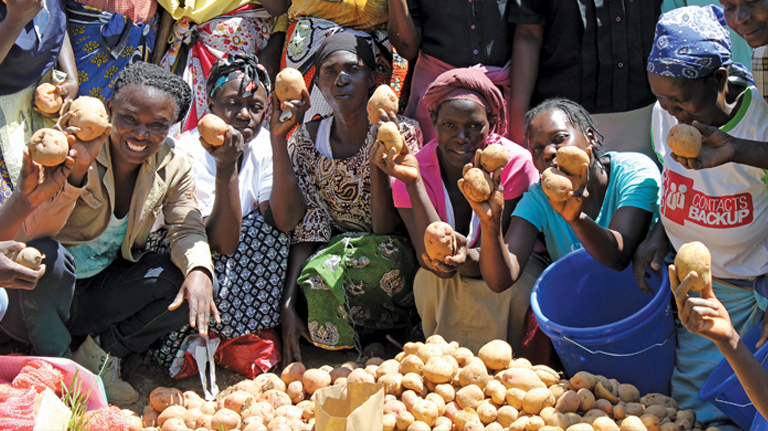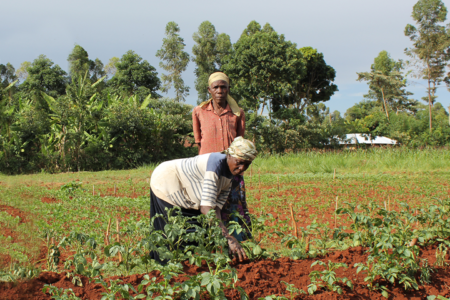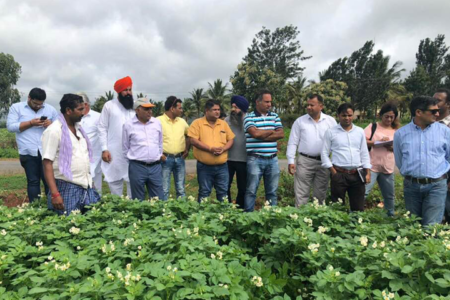
Potato has underexploited potential to contribute to food security and incomes among Kenyan smallholders. This project builds on the past work of the International Potato Center (CIP) to increase the current low levels of productivity. It focuses on building the skills of farmers and other stakeholders to apply good agricultural practices and increase the availability of quality planting materials.
Background
Potato is an important food crop and major source of household income for Kenyan smallholders. It is a nutritious, high-value, short-season crop, that grows well in the highland and mid-altitude environments. Around 800,000 smallholders rely on potato for their household food security and incomes, with another two million people engaged in the potato value chain. At present, the crop suffers from low productivity, with average yields of around 7 t/ha. Field trials have demonstrated that up to 35 t/ha can be achieved if the main constraints to production can be overcome. These include a shortage of pest- and pathogen-free seed potatoes for planting, lack of availability of improved high-yielding varieties, poor agronomic practices, decreasing soil fertility, and environmental stresses including adverse weather, pests, and diseases.
This project builds on CIP’s work over the past 15 years to overcome the hurdles facing potato farmers and businesses in Kenya. The most appropriate route to improving productivity is to increase the availability of quality planting materials. This includes the implementation of strategies to decentralize seed systems and improve seed quality, as well as enhancing crop production techniques.
Objectives
- Improve the application of good agricultural practices for growing potato; and
- Increase the availability of high-yielding, disease resistant, planting materials.
Approach
The complexity of potato farming systems in Kenya requires a multi-faceted approach to overcome the main productivity constraints. Aligned to the government of Kenya’s national potato strategy—designed to develop the crop and its value chain—the project takes an ‘innovation site’ approach that brings together research, extension and other stakeholders, with farmer-to-farmer knowledge exchange maximized through the establishment of farmer field and business schools.
Capacity-building for agricultural extension officers and lead farmers includes training on the innovative ‘rooted cutting’ multiplication technology, which is a fast, costeffective way to produce quality seed potato. In addition, this technology could form the basis for new farmerbased enterprises. Lead farmers interested in establishing certified seed potato production businesses are also identified. These entrepreneurs are given training on appropriate technologies and business skills.
Expected outcomes
CIP will establish at least 32 innovation sites over the duration of the project to demonstrate newly released varieties, seed management strategies, fertilizer application, pest and disease management, organic farming, improved crop rotation and the rooted cutting multiplication technology to around 1,500 farmers. The innovation sites host field days, where farmers receive training, share knowledge and contribute their ideas. At least 3,680 smallholders will receive training on good agricultural practices for growing potato. The goal is for farmers to develop their capacity, so they are able to produce 25% of their seed potato requirements by saving quality seed tubers on their own farms.
Farmer field and business schools provide an important pathway for dissemination of new ideas and approaches to the wider farming community. Fifteen farmer field and business schools will be established in each growing season, with feedback from farmers captured and fed into future activities. Topics demonstrated will include improved crop rotation patterns, use of organic fertilizer and pest and disease management.
The ultimate goal is for large-scale farms, cooperatives and seed companies to invest in the production of certified seed potato. CIP will, therefore, provide technical backstopping to interested stakeholders in seed production and business development, as well as supporting their applications for phytosanitary approval and other necessary certification.
| Key outputs | Number |
| Farmers trained in good agricultural practices | 3,680 |
| Innovation sites established | 32 |
| Percentage of seed potato requirement produced by farmers themselves | 25% |
| Amount of certified seed potato produced by small and medium enterprises | 600 tons |
Contact
Kalpana Sharma
CIP, Kenya
kalpana.sharma@cgiar.org
Thanks to our donors



